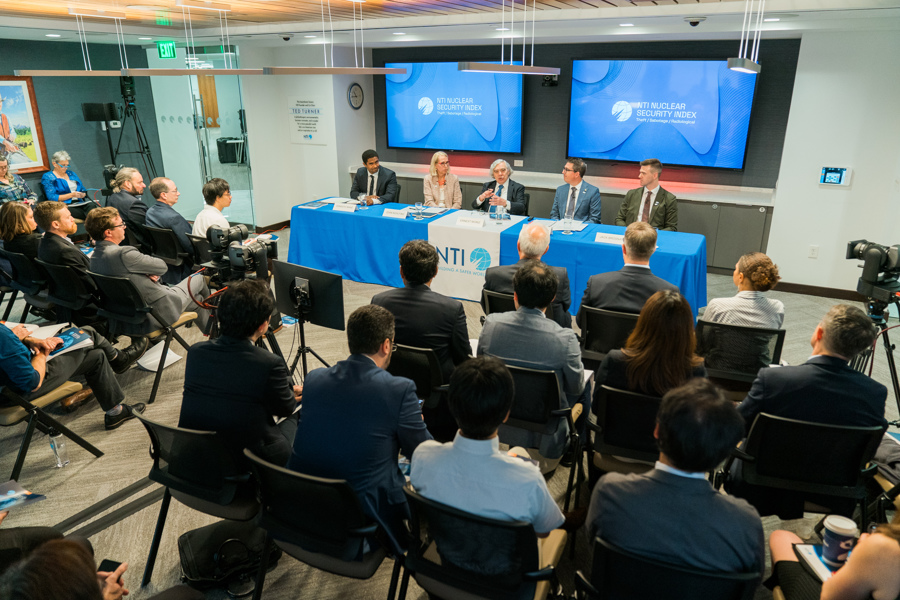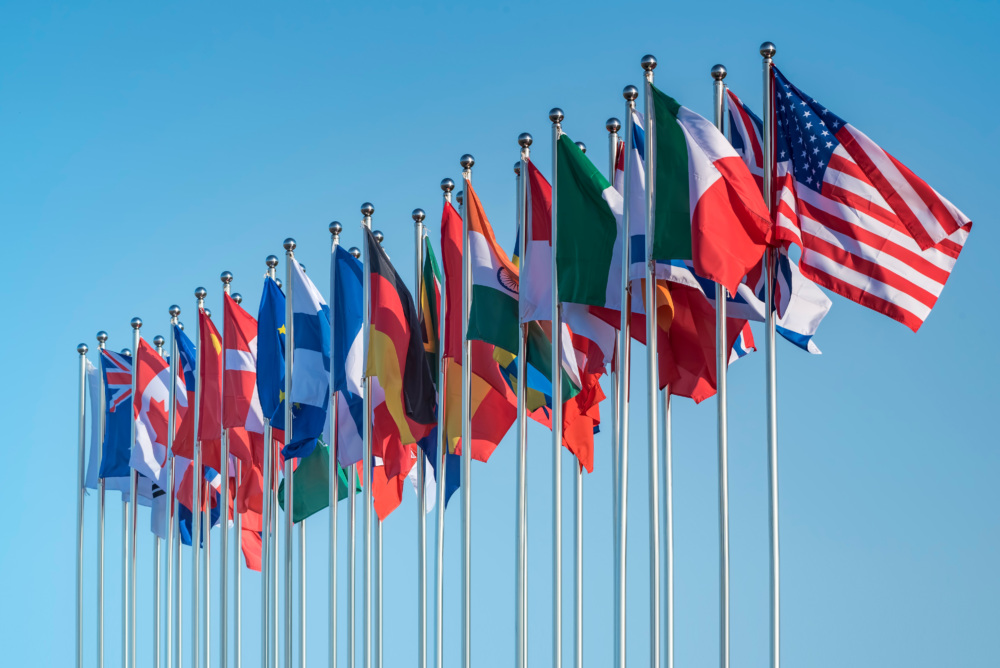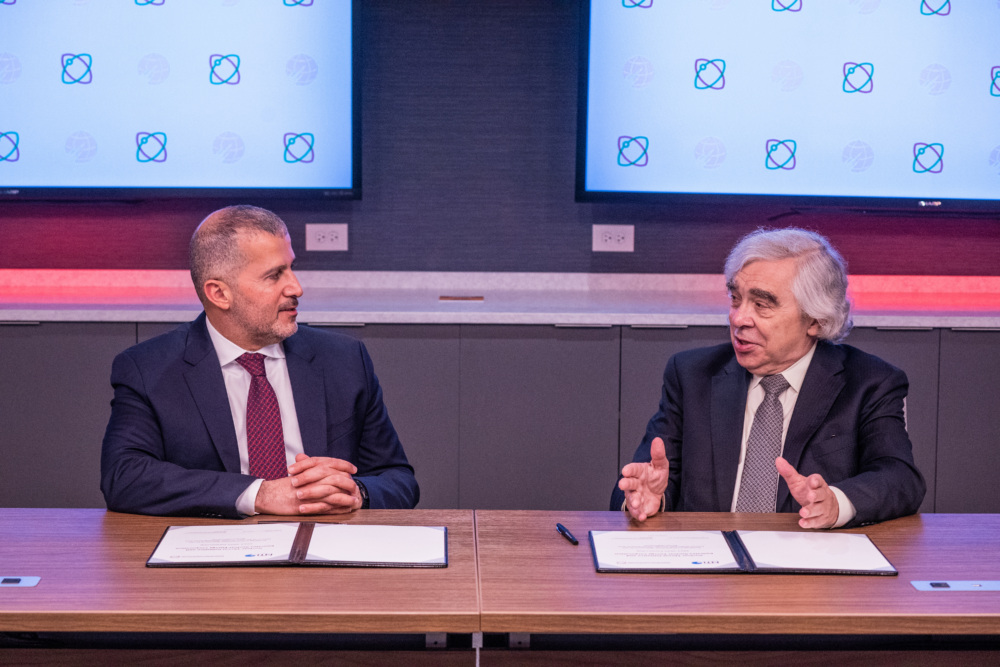Progress on Global Nuclear Security Has Slowed Significantly, According to 2020 NTI Index; New Assessment of Dirty Bomb Risks Finds Huge Gaps in Security of Radioactive Sources
The 2020 NTI Nuclear Security Index finds that progress on protecting nuclear materials against theft and nuclear facilities against acts of sabotage has slowed significantly over the past two years, despite ongoing, major security gaps. An alarming development at a time of growing global disorder and disruption, the decline in the rate of improvement to national regulatory structures and the global nuclear security architecture reverses a trend of substantial improvements between 2012 and 2018.
The decline suggests that without the driving force of the Nuclear Security Summits, which ended in 2016, or similar high-level international events, attention to nuclear security has waned—and it has done so at a time when terrorist capabilities and growing cyber threats contribute to a more complicated and unpredictable environment. At the same time, geopolitical tensions and events such as the COVID-19 pandemic are undermining cooperation and exposing the limits of how countries cope with cross-border threats.
Countries have continued to take steps to strengthen nuclear security regulations and support global norms, but since 2018, the number of countries improving their scores in the NTI Index has declined across all three rankings. The number of countries with worsening scores has increased since 2018 in both the theft ranking for countries without materials and the sabotage ranking. Overall, the average amount that a score improved has declined in all three rankings compared with previous years, showing that even countries that are improving are taking fewer actions.
“Given the challenging backdrop for the sharp decline in progress, it is more important than ever to identify shortfalls and to call for governments, industry, and the international community to once again step up their efforts to prevent a catastrophic attack using stolen nuclear materials or an act of sabotage that could further shake global foundations,” said NTI Co-Chair and CEO Ernest J. Moniz.
The NTI Index—which is produced biennially with the Economist Intelligence Unit (EIU) and developed with an International Panel of Experts—serves as a critical resource and tool for assessing global nuclear security. For the fifth edition, NTI this year took a fresh approach to the NTI Index to account for past progress on nuclear security and new tools to address risks. Key changes across all three rankings are detailed in the full 2020 report.
New in 2020: Radioactive Source Security Assessment
In addition, for the first time, NTI this year is releasing a separate Radioactive Source Security Assessment in conjunction with the NTI Index. The first-of-its-kind assessment, which does not rank or score countries, evaluates national policies, commitments, and actions taken in 175 countries and Taiwan to prevent the theft of radioactive sources that could be used to build dirty bombs. The key finding: the international architecture for radiological security is extremely weak, and thousands of radioactive sources remain vulnerable to theft from hospitals, university labs, and industrial sites where they are used for a variety of beneficial purposes.
Although a radiological dirty bomb would not cause mass casualties or injuries, the consequences would be significant: environmental and psychological damage, enormous clean-up costs, and the inability to use the area around the explosion for years.
“These sources often are poorly secured and held in locations open to the public, such as hospitals and universities, making them vulnerable to theft by extremists looking to cause chaos,” says NTI Vice President Laura S.H. Holgate. “The good news is that these sources can be replaced with equally effective alternative technologies.”
Country Rankings
On nuclear materials security, the 2020 NTI Index finds that Australia ranks first for the fifth time with the best nuclear security conditions among the 22 countries with weapons-usable nuclear materials and for the third time in the sabotage ranking of 46 countries and Taiwan that have nuclear facilities at which an act of sabotage would could result in a dangerous release of radiation. In the ranking for 153 countries and Taiwan without materials, New Zealand and Sweden tie for first. Most improved among countries with materials in 2020 is Pakistan, which improved its overall score by adopting new on-site physical protection and cybersecurity regulations, improving insider threat protection measures, and more. Pakistan’s score improvement for regulatory measures is the second largest improvement for regulations in the Index since 2012.
Findings and Recommendations
The 2020 NTI Index recommends that to reverse the decline in nuclear security improvements, countries must strengthen and sustain political attention on enhancing nuclear security regulations and on building a more effective global nuclear security architecture.
The NTI Index includes nine additional high-level findings and recommendations.
- No countries have eliminated their stocks of weapons-usable nuclear materials since 2016, and the number of countries with those materials has plateaued. Decreases in quantities of materials also are slowing. Countries with materials should revive efforts to reduce stocks of highly enriched uranium and plutonium and should focus on long-term, sustainable stewardship of materials.
- Regulatory requirements for nuclear security are not comprehensive, with significant weaknesses in key areas such as insider threat prevention, security culture, and cybersecurity. Countries must strengthen these regimes; theft of nuclear materials or sabotage of a nuclear facility anywhere in the world would have significant implications for all countries, including potential public backlash against the use of peaceful nuclear technology, such as nuclear energy.
- Countries do not have adequate measures in place to address the human factor of nuclear security. Countries must strengthen insider threat-prevention measures and security culture.
- Cybersecurity regulations are slowly adapting to the growing cyber threat to nuclear facilities, but the adoption of these requirements continues to trail the urgency of the threat. Given the rapid evolution of cyber threats, countries must strengthen cybersecurity at nuclear facilities including through (a) integrating physical protection and cybersecurity; (b) protecting critical digital assets, such as systems related to physical protection, control, accounting, and safety; and (c) building greater awareness of cyber threats among facility personnel.
- Despite continued actions to strengthen the global nuclear security architecture, the rate of improvement has slowed and significant gaps in the architecture remain. Countries must work to strengthen and sustain political attention on nuclear security, the International Atomic Energy Agency (IAEA) and the United Nations should work to achieve universalization of key legal instruments governing nuclear security, and countries should implement their treaty obligations and participate in voluntary initiatives, among other steps.
- Countries without nuclear materials are not sufficiently engaged in efforts to bolster the global nuclear security architecture. To address regional disparities and conflicting priorities, the IAEA should work with countries to build a stronger, more inclusive concept of nuclear security stressing that nuclear security is critical to maintaining public support for peaceful uses of nuclear technology.
- The IAEA still lacks the political and financial support it needs to fulfill its nuclear security mission. Countries should increase support for the IAEA by contributing to its Nuclear Security Fund and supporting and participating in IAEA activities, and the IAEA should work to build awareness of those activities and of how nuclear security helps countries benefit from peaceful nuclear use.
- With the exception of publishing regulations, countries’ actions to build confidence in nuclear security through information sharing and peer review remain limited. Countries should increase transparency and confidence by publishing annual nuclear security reports, by making public declarations about their progress on nuclear security, and by participating regularly in peer reviews, among other steps.
- More countries are interested in acquiring nuclear technology for research or energy purposes, but nine countries planning new nuclear power programs have varying levels of preparedness to take on nuclear security responsibilities. To be responsible stewards, countries considering new nuclear energy capabilities should establish legal and regulatory frameworks that address insider threat prevention, cybersecurity, security culture, physical protection, control and accounting procedures, and response capabilities.
For more information, including data to download in Excel models, go to www.ntiindex.org. The website includes interactive infographics, where visitors can explore maps, compare country results, and determine how to prioritize steps that countries can take to improve their nuclear security conditions.
About the Nuclear Threat Initiative
NTI is a nonpartisan, nonprofit global security organization focused on reducing nuclear and biological threats imperiling humanity. Founded in 2001 by former U.S. Senator Sam Nunn and philanthropist Ted Turner, who continue to serve as co-chairs, NTI is guided by a prestigious international board of directors. Ernest J. Moniz serves as co-chair and chief executive officer; Joan Rohlfing is president and chief operating officer. Visit NTI at www.nti.org.





